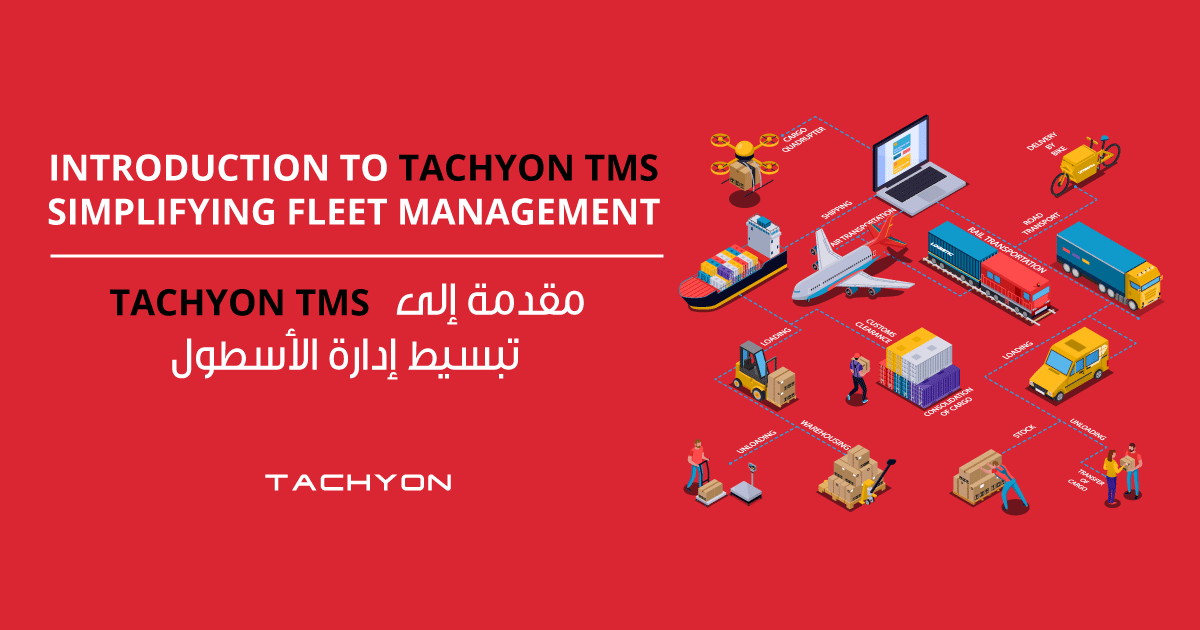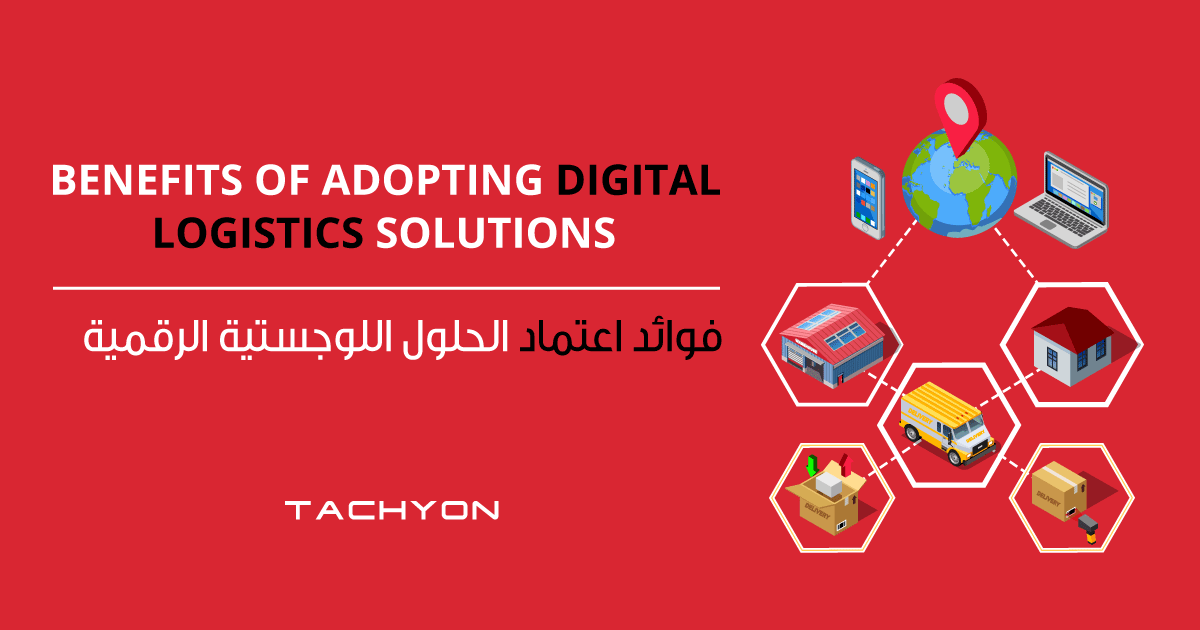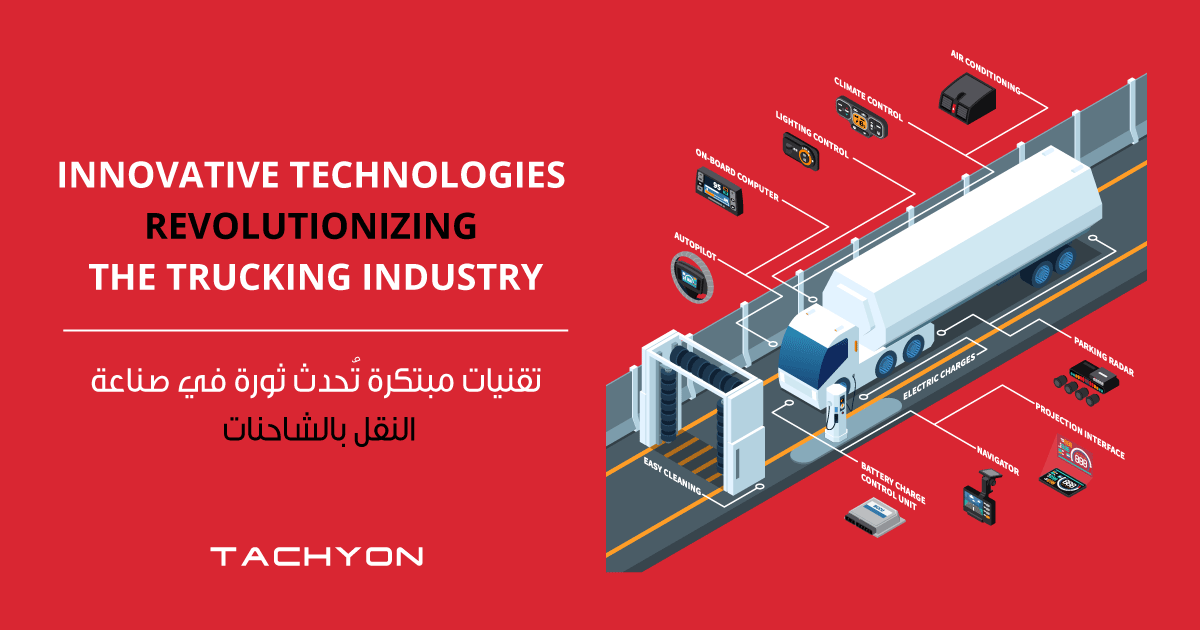Tachyon news
Blog
Digital transformation of logistics in Saudi Arabia

Supply chain managers across nearly all industries worldwide have come under increased scrutiny due to a number of factors, including shortages of goods, inflation, changing consumer choices, and new laws about human rights and supply chain sustainability. Businesses need to know more than simply what their suppliers and consumers do. They require a comprehensive, up-to-date view of suppliers’ suppliers and consumer customers. Digital logistics transformation in Saudi Arabia has brought benefits to logistics businesses. In this article, we will review and discuss the different aspects of digital logistics transformation and its benefits.
What Is Digital Transformation?
Digital transformation infuses digital technologies into all facets of a business to improve management and add customer value. This includes implementing modern technologies like robotics, artificial intelligence, the Internet of Things (IoT), and advanced data analysis that shows customer and supplier trends and behaviors. Applications that automate supply chain, accounting, and hiring processes are also included.
When starting a digital transformation, a manufacturing company may decide to switch from manual data input and Excel spreadsheets to a cloud-based finance system. Henceforward, they might start investigating analytics solutions that use information gathered from the manufacturing floor and across the supply chain to provide insights and enhance procedures.
But digital transformation goes beyond simply obtaining and utilizing new technologies. Additionally, it entails a shift in company culture that calls on managers to evaluate every facet of their operations, such as the personnel they select, the markets they serve, and their interactions with suppliers and clients.
The Development of Technology in the Logistics Sector
For supply chain planning and execution, all manufacturers except the smallest ones use technology. However, surprisingly, many logistics managers still execute manual operations, such as sending documents and phoning vendors to get delivery details. To achieve timely delivery shipment of goods at the lowest feasible cost, early initiatives to digitize supply chain operations concentrated on integrating data from finance applications with data from planning, warehouse management, and other related systems.
The inability to integrate more cross-functional data, including inventory, order, and shipment data, as well as the capacity to identify issue root causes and forecast supply chain interruptions, were the limitations of those technologies. Future supply chain management systems will incorporate information from the whole extended organization, including finance. The future supply chain management platforms will combine data from the entire allegorical organization, including finance, inventories, third-party suppliers, and consumers, to improve efficiency and reduce costs.
Export employees can now view carrier reservations, invoices, and billing in one location. Mazda Motor Logistics has insight into ordering vehicles and parts and their delivery. Additionally, they removed worksheets from their workflow. By integrating Oracle Product Hub, they can also handle all of their master goods information with an approval flow around divisions. Eventually, the corporation could shift personnel into customer support positions by automating certain aspects of the purchasing and delivery process.
Supply Chain Digital Transformation
The process of implementing electronic devices, technologies, and approaches to improve productivity and optimize every aspect of the supply ecosystem is known as supply chain digital transformation. The primary objective of supply chain management (SCM) is to optimize the movement of resources, starting from the procurement of raw materials and ending with the delivery of finished goods to clients. Businesses must embrace a connected strategy and abandon the idea of a linear chain in order to alter their supply chains digitally.
Factories may gain real-time visibility into their supply chains by using digital transformation to gather, exchange, and evaluate statistics at every stage of the process, covering demand forecasting, asset control, warehouse management, logistics and shipping management, purchasing, and order delivery. Companies must ensure that workers can implement and utilize the most recent supply chain systems to get the most from their recently introduced technology. This may require hiring new personnel as well as improving less tech-savvy employees.
Digital Developments in Saudi Arabia Logistics
Thanks to inventive and technologically advanced approaches, the Saudi Arabian logistics sector is growing more compelling as the globe quickly adopts new technologies. The control of the supply chain is delicate and requires extra care to be effective. Digital approaches powered by technology give the logistics network process more flexibility and visibility. Proper forecasting support in measuring prediction and real-time inventory management is worthwhile. With increased agility, businesses can better manage shipping movements and deliver higher-quality customer care. The region’s trends are moving toward contemporary logistics as supply chain network architecture, logistics effectiveness, cargo analysis, and tracking all meet Saudi Arabian regulatory standards. Advanced supply chain management systems and corporate intelligence procedures are supported and made more efficient by automation.
In the future, automation and artificial intelligence (AI) will be essential parts of logistics management. Artificial intelligence (AI) will be utilized in cargo and related shipments to automate repetitive tasks, allowing logistics experts to work on more required creative initiatives. AI is being used by a few logistics organizations in Saudi Arabia to track packages and predict transportation-related supply chain problems. Furthermore, additional advances are used to track the commodities in real time.
For now, expect to see more autonomous vehicles such as drones, cranes, and shipping trucks on roadways and warehouses. Organizations will value how fast they can provide data analytics to identify the optimal pathways for cutting delivery times despite confronting persistent challenges. The sector is being modernized by the integration of new technology in logistics. Among the technologies Saudi logistics companies use are artificial intelligence algorithms, data management systems, AI analytics, and the Internet of Things.
Tachyon’s Role in Digital transformation in logistics
Tachyon’s top digital logistics platform provides clients with innovative features and logistics services. Its digital platform makes it easy for users to monitor and manage their shipment process and offers several services. By registering on our platform, you can gain exposure to a first-rate service network that provides one-stop shopping for all your logistics needs. With truck routes, real-time data and information visibility, e-invoicing, execution, and billing are all facilitated by this system. We provide the most effective, feasible, customized options with technological features and support all logistical parties with our services in Saudi Arabia.
Frequently Asked Questions
What is digital transformation in Saudi Arabia’s logistics?
The logistics system in Saudi Arabia has technologies in use as the latest trends. Digital technology and standards of transportation of goods and services are now supported by data analytics. AI, autonomous vehicles, and electric trucks are the latest technologies in the transport industry.
What is the role of digitization in logistics?
Digitized logistics services set up a strong supply chain management system with accuracy and efficiency. Automation has reduced human errors and delivery delays. User experience is increasing with better quality of work and outcomes.
Who is the leading player in the Saudi logistics industry?
Tachyon is the leading player in the Saudi logistics industry, digitizing the logistics functions through its digital platform. It offers Saudi Arabia’s logistics industry the most advanced technological tools, various services, and revolutionary solutions.
Does Digital transformation give benefits?
Digital transformation offers multiple benefits, including:
- Improved Efficiency through automation and AI
- More Transparency with digital platforms
- Customized Solutions
- Sustainable Practices
- customer satisfaction
- Reduced Errors & Delays
- Convenient Management
- Supply Chain Visibility





